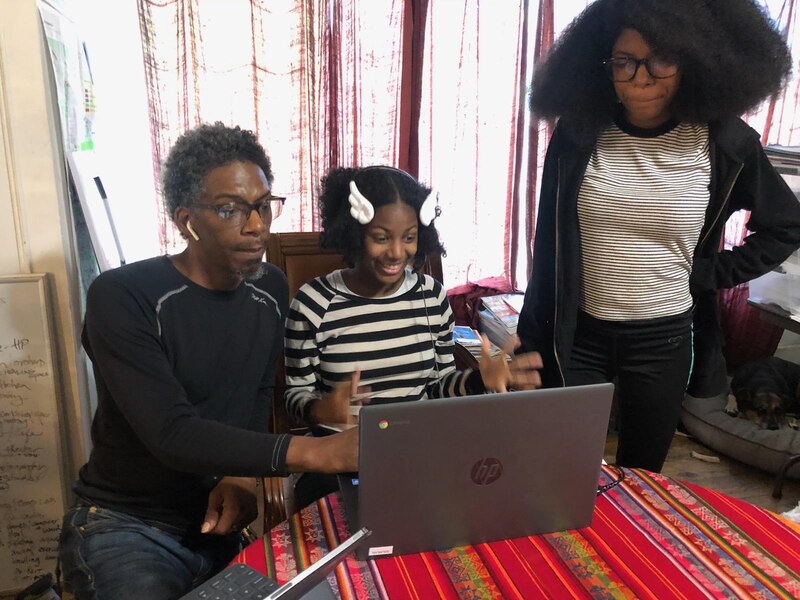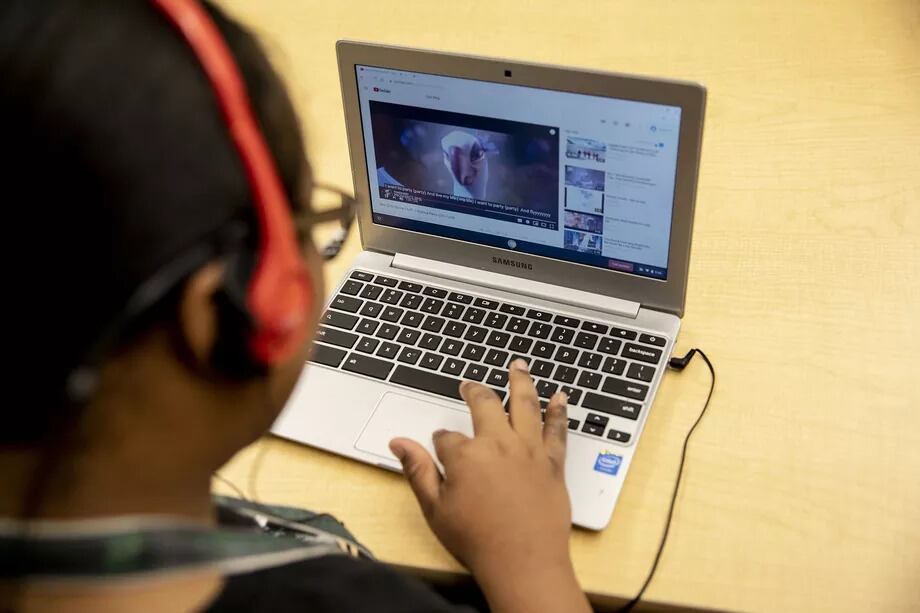The Detroit district is creating focus groups and expanding its technical support hotline to address a number of complaints that have poured in since the first day of school about too much screen time for students and many technology glitches.
The complaints have come in online and filled the public comment period of the district’s school board meeting Tuesday, where dozens of teachers, community organizers, students, and parents shared their frustrations and anger.
These comments reflect complaints that also have come from some of Detroit’s charter schools — and schools across the nation — as districts launch an unusual year while adjusting to the effects of the pandemic on learning. Over the last few days, Chalkbeat spoke with both district and charter students, parents, and teachers. In the district, 75% of the students are learning online.
Among those who spoke at the district board meeting was Ama Russell, a Cass Technical High School senior, who complained of sitting in front of a computer screen for eight hours a day. On Friday, she said, her eyes started burning after class.
“This is absolutely horrible...our mental health is deteriorating,” said Russell, who demanded an immediate change to the way the district is scheduling online classes.
Michigan state senator Stephanie Chang, whose daughter is a kindergartner in the district, told board members she’s disappointed with the “inflexibility” of the current virtual schedule.
“It’s not realistic for a 5-year-old,” said Chang, who nonetheless noted she’s encouraged the district is open to modifying schedules.
District officials addressed the complaints earlier in the meeting, with Superintendent Nikolai Vitti announcing plans to look into screen time, schedules, and other issues.
“I hear students. I hear parents. I recognize modifications are needed,” Vitti said. “We will make changes and we will listen.”

Across Michigan, 86% of schools provide some form of in-person learning, but it’s unclear exactly how many students statewide are learning online and how many are learning in schools. In Detroit, concerns about online learning are being expressed across the city.
A parent in a Detroit charter school, Donyetta Hill, has cut back her work hours to be at home for her daughter, a fifth-grader at the Cornerstone Jefferson-Douglass Academy. Hill said she had to choose between “Am I going to work? Or am I gonna sit here and teach my daughter because she can’t do this by herself?” she said. Her daughter’s education won. But Hill, a community organizer, said she wishes parents had more resources to help their children with online learning.
“There needs to be some type of training or some type of online workshop. Or even some type of class to help parents learn how to interact with their children,” she said. “The teachers, the staff. They can’t do this on their own. We all have to work on this together.”
The first two weeks of online learning have indeed been rocky for eighth-grader Anaya Thomas, who attends University Prep Science and Math Middle School, a charter school. On the second day of virtual learning, Anaya’s morning algebra class had an unwelcome visitor: an apparent teenager who entered the virtual room and started “screaming, cussing and playing music” during the teacher’s lecture. Her teacher’s video feed also kept freezing.
“I’m a little bit afraid of what two months, three months, or six months of this is gonna do,” said her mother Angela Lugo-Thomas. “The novelty is starting to wear off already.”
Merarys Popa, a senior at Cass Tech, is worried that too much time will be spent on fixing technical errors, leaving less time for actual learning. She’s worried students will have a harder time meeting academic expectations and may fall behind.
“I feel like we’re just not prepared,” she said during a Monday interview.
But too much screen time is exhausting, said Merarys and senior Lamont Satchel.
“I’ve never been so emotionally drained out of school,” Lamont said. “When you’re online everything moves slow.”
Virtual classroom sizes are also a big issue. Lamont said his financial literacy class has 43 students, and Merarys said her math class has about 30 students. They both said that such huge classes put a strain on the Wi-Fi connection.
“I had an issue for three of my classes getting on. [The software] said ‘We know you’re trying to get in but please be patient’” Lamont said. “I couldn’t hear one of my teachers for 35 minutes of the whole class.” Merarys said she kept getting kicked out of classes.
District teacher Julie Hughes was frustrated because she didn’t believe she had enough training focused on online learning. She was also among several who accused the district of sabotaging online learning.
“You wanted to sink virtual in order to have your face-to-face succeed,” Hughes said to Vitti during the board meeting.
Another district teacher Marnina Falk said that the school district should provide guidance on how teachers can provide live instruction, and how students can use the various software the district needed for online learning.
“Our students and community deserve better than this,” she said, referring to the first week of virtual school.
Virtual class schedules are structured identically to the in-person learning schedule. Lamont said he has a 55-minute first-hour class, a lunch, and the rest of the classes last for 50 minutes. Each student has five-minute passing times to transition to each virtual class.
Vitti stressed that the virtual schedule was made to mirror the in-person schedule for two reasons.
The district wanted to provide rigorous instruction and consistent access to a teacher. He said parents complained during distance learning this spring that students were working independently and had trouble getting help from teachers.
Also, Vitti said the district could receive more scrutiny from the state if it tried to rely on assignments — rather than live instruction — to fulfill legislative requirements for virtual attendance.
“That would create a heavy burden on teachers and students,” he said. If schools can’t provide documented proof of assignments to state auditors, it could also result in a loss of funding.
For Anaya, Lamont, and Merarys there were some bright spots in remote learning. Anaya liked creating a virtual locker for one of her teachers, which she filled with an image of a toolkit to show her interest in engineering. She also liked having conversations with her science teacher and classmates about empathy and social justice.
Lamont enjoyed how his biology teacher began each class with morning stretches. During each stretch, the teacher would give an anatomy lesson, describing the functions of each body part.
During the first week of online classes, district teacher Heidi West is so far optimistic about her sixth-grade students’ virtual attendance. Only a few students didn’t log in to each of her Spanish and English language arts classes.
Even though student interactions were positive, West described the week of technical errors as “a nightmare.”
West couldn’t upload assignments to Schoology, the district’s online learning management system. So she ended up calling a technology support helpline.
“I was on an IT call for an hour before they told me I had to go somewhere to get a Microsoft Office upgrade,” she said. “Then it turns out it wasn’t even my computer. It was another glitch.”
For those still experiencing technical issues, the Detroit district is expanding its hotline services to offer technical support. The hotline number is 1-888-466-3978 and will be available Monday through Friday 8:30 a.m. to 4:30 p.m.







